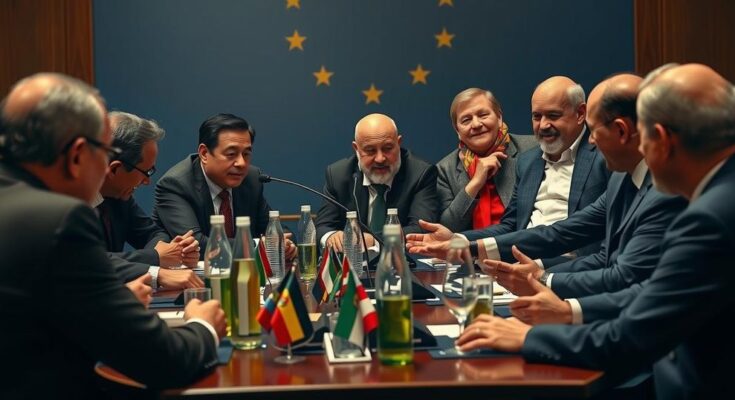Chinese President Xi Jinping met with US President Joe Biden at the APEC summit in Peru, reaffirming China’s commitment to working with the incoming Trump administration on various issues, including trade and cybersecurity. Biden acknowledged candid discussions despite past disagreements. The meeting occurs amid concerns about Trump’s proposed tariffs on Chinese goods and tensions surrounding Taiwan and Russia, highlighting the delicate balance of US-China relations.
During the recent Asia-Pacific Economic Cooperation (APEC) forum held in Lima, Peru, Chinese President Xi Jinping engaged in significant discussions with outgoing US President Joe Biden regarding ongoing tensions between the two nations. Xi expressed China’s commitment to collaborating with the incoming administration of President-elect Donald Trump, stating that the goal of stabilizing China-US relations remains steadfast despite recent challenges. Biden acknowledged the differences in their past discussions but emphasized the need for candid communication between the two leaders. These talks were particularly pertinent considering Trump’s forthcoming presidency, in which he has proposed substantial tariffs on Chinese imports as part of his ‘America First’ strategy, a stance that is firmly opposed by Beijing. Moreover, the discussions highlighted mutual concerns regarding cybersecurity issues, trade dynamics, and geopolitical tensions surrounding Taiwan and Chinese support for Russia. The backdrop of these negotiations underscores the delicate balance in US-China relations, particularly as both countries navigate a transition in leadership. China’s economy is currently enduring significant strain from Biden’s trade policies, which include restricting US investments in pivotal advanced technologies and imposing selective export controls on high-end computer chips. Consequentially, these economic measures are anticipated to play a critical role in future bilateral negotiations. Additionally, Taiwan’s positioning as a contentious internal matter for China remains a key topic, particularly with Taiwan’s leaders planning international visits that could provoke Beijing’s ire. Amidst these complex dynamics, Xi articulated a vision for a cooperative and stable relationship, urging both nations to transcend rivalry and embrace a partnership approach. The importance of American economic engagement with China continues to resonate as Xi embarks on a diplomatic journey in Latin America, aiming to enhance bilateral ties and secure trade agreements that align with Chinese interests.
The recent talks between Chinese President Xi Jinping and outgoing US President Joe Biden at the APEC summit exhibit the intricate interplay of diplomacy as the United States transitions between administrations. With new leadership approaching in Washington, both countries are keenly aware of the potential shifts in bilateral relations, particularly given Trump’s previous commitments to adopt stringent trade measures against China. Furthermore, the ongoing concerns regarding cybersecurity, Taiwan, and geopolitical affiliations, particularly with Russia, add layers of complexity to this diplomatic engagement. Xi’s assertion of China’s intent to work cooperatively with the incoming Trump administration reveals an understanding of the necessity for communication in a changing political landscape. Conversely, the anticipated US response to various Chinese strategies in trade and international affairs continues to shape the overall tenor of relations between these major global powers.
The recent encounter between Presidents Xi Jinping and Joe Biden illustrates the necessity for an ongoing dialogue amid a transitioning US administration. As both leaders contend with significant geopolitical and economic challenges, they underscore the imperative of cooperation over rivalry in order to navigate the complexities of contemporary global affairs. The impending arrival of President-elect Trump adds a new dimension to this relationship, with comprehensive discussions needed regarding trade, cybersecurity, and regional stability in East Asia. Moving forward, the actions taken by each nation in response to these discussions will likely have profound implications for both bilateral relations and international stability.
Original Source: www.channelnewsasia.com




